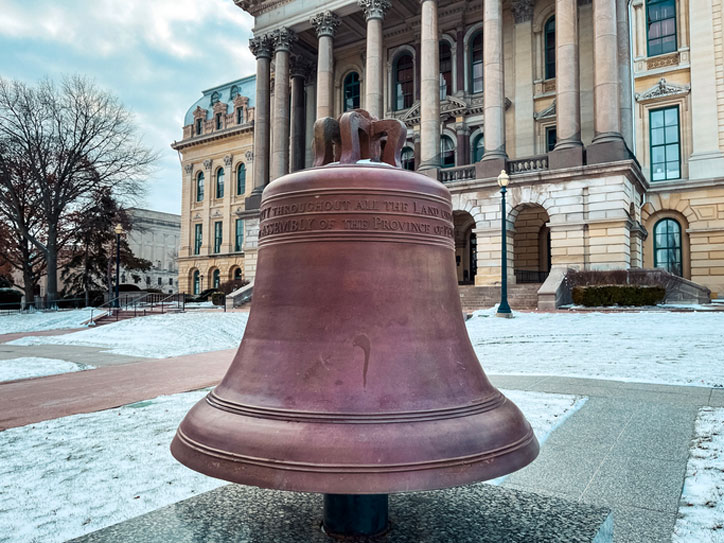Written by Sam Medley

To achieve your goal of becoming a social worker in Illinois, you’ll need to decide which type of Illinois social work license suits your interests and follow the steps to obtain it.
Under the Clinical Social Work and Social Work Practice Act, Illinois social workers may be licensed as one of the following professionals:
- Licensed clinical social worker. A “person who holds a license authorizing the independent practice of clinical social work in Illinois” under an employer, in private practice, or as a representative of a public human service agency or certain nonprofits.
- Licensed social worker. A “person who holds a license authorizing the practice of social work, which includes social services to individuals, groups or communities in any one or more of the fields of social casework, social group work, community organization for social welfare, social work research, social welfare administration, or social work education.”
Under the Illinois Department of Financial and Professional Regulation (IDFPR), the Social Work Examining and Disciplinary Board — which comprises six licensed clinical social workers, two licensed social workers and one public member — regulates social work practice and licensing in Illinois.
Board members advise the Financial and Professional Regulation secretary on social work professional standards and qualifications of prospective licensees.


Five Steps to Becoming a Social Worker in Illinois
The core steps to becoming a social worker in Illinois apply to both levels of licensure to some degree. One difference between a licensed clinical social worker and a licensed social worker is the master’s degree requirement. However, a postsecondary degree is required for both.
This career guide covers the basics, but you should always confirm information you gather online with the IDFPR — or the social work regulatory board in your state — to ensure that it’s up to date.
Step 1: Earn Your Bachelor’s Degree
To become licensed in Illinois, you must have a bachelor’s degree.
A bachelor’s degree opens opportunities for entry-level social work positions and serves as the foundation for an advanced degree and career growth.
If you hold a Council on Social Work Education (CSWE)-accredited bachelor of social work (BSW) degree, you may be eligible for an advanced standing graduate program. Advanced standing programs are accelerated Master of Social Work (MSW) programs that build on the knowledge and skills you gained from the coursework you completed in your bachelor’s program.
According to the Council on Social Work Education, Illinois has 19 undergraduate degree programs across the state — from Chicago to Springfield to Bourbonnais — several of which offer online and hybrid course delivery modes for flexibility and convenience.
Step 2: Complete a Master of Social Work (MSW) Program
If you plan to work in clinical settings or provide clinical services, you’ll apply for the Illinois licensed clinical social worker (LCSW) designation. Before you can apply for licensure, you must earn your MSW degree.
Master of Social Work programs cover advanced social work theories and prepare students to provide social work services in a variety of specializations, including child welfare, child and family services, school social work, health care and medical social work, mental health and substance abuse services, geriatric social work, immigration services, and a host of others.
You will also explore social work policy and other macro-level (indirect, large-scale) and mezzo-level (local and small community) projects and initiatives.
Like BSW programs, MSW programs may be offered in a traditional campus-based delivery mode with face-to-face instruction or with courses delivered fully or partially online. Illinois’ online MSW programs are every bit as rigorous and reputable as their traditional counterparts.

Step 3: Gain Supervised Experience as an Associate Clinical Social Worker
Field experience is necessary for anyone entering the social work profession.
According to the Illinois Chapter of the National Association of Social Workers, your post-graduate field hour requirements depend on your degree and the license you seek.
Supervised Clinical Experience Requirements for LSW Applicants
- CSWE–accredited bachelor’s program graduates: Complete three years of supervised professional experience subsequent to obtaining the degree.
- CSWE–accredited master’s program graduates: Supervised professional experience is not required.
Supervised Clinical Experience Requirements for LCSW Applicants
- CSWE–approved master’s program graduates: Complete 3,000 hours of supervised clinical professional experience.
- CSWE–approved doctoral program graduates: Complete 2,000 hours of supervised clinical professional experience.
These hours must be obtained according to the IDFPR rules. Full-time candidates must acquire at least 30 hours and less than 40 hours per week. Part-time candidates must acquire a minimum of 15 hours per week and a maximum of 29 hours per week.
Step 4: Apply for Licensure
Download the four-page LSW and LCSW application from the IDFPR website.
Determine the appropriate pathway to licensure as detailed on the application and apply under it.
Licensure Pathways
- Non-examination (LSW only)
- Endorsement (LSW and LCSW)
- Acceptance of examination (LCSW only, test administered in another state)
- Examination (LCSW only)
You will also see an application for restoration, which applies to applicants who hold an inactive Illinois LSW or LCSW license. If you’re a first-time applicant, you will not use this licensure method.
First time applicants who have not taken a licensure exam will get approval from the Board. If this is the case for you, enter N/A in Part V of the application.
In Part VII of the application, you will enter the codes from the supplemental reference sheet to specify:
- Examination Test Codes
- Test Center Code for your preferred examination site
- School code for your school of graduation
- Number of times you have taken this exam in Illinois or any other state
Collect the supporting documentation to submit with your application. Read the instructions on the application carefully to ensure that you have included all the necessary documents — such as proof of legal name change for applicants whose name on their supporting documents is different from the name on their application — and completed each relevant section of the application to avoid delays with processing.
Submit your application, supporting documents, and application fee to the Illinois Department of Financial and Professional Regulation at the following address:
Division of Professional Regulation
P.O. Box 7007
Springfield, Illinois 62791
According to the application instructions, applications received between July 1, 2023, and June 30, 2024, the fee is waived. After June 30, 2024, the fee is $50.
Your application will be valid for three years from the day of receipt.
Step 5: Pass the Licensed Clinical Social Worker Exam
If you are applying under the Examination pathway for the LCSW license, you need approval from the Illinois Department of Financial and Professional Regulation or the Illinois Social Work Examining and Disciplinary Board to take the Association of Social Work Boards (ASWB) examination.
You should receive a notification from IDFPR within six weeks with the status of your application. Once you have been approved to take the exam, visit the ASWB website to register for the exam and pay the $260.00 fee.
You may request accommodations by submitting the Reasonable Accommodation Request for Examinees with Disabilities form along with your application.
Note that as of January 1, 2022, LSW applicants do not have to take the ASWB exam.
How Long Does it Take to Become a Social Worker in Illinois?
Depending on your current level of education and career goals, you can become a social worker in Illinois in as few as five years or as many as eight years.
If, for example, you have already earned a bachelor’s degree in social work from an accredited program and enroll in an advanced standing program, such as Northeastern Illinois University’s Advanced Standing Social Work, MSW, you can obtain your graduate degree in less time than the it would take for the full MSW program.
When you factor in the required supervised experience hours, exam approval and, if necessary, the 90-day waiting period to retake the exam, becoming a licensed social worker in Illinois can take up to eight years.
LSW
Requirement | Duration |
Bachelor’s degree | 4 years |
Field experience for LSW (in addition to a 4-year bachelor’s degree) | 3 years |
LCSW
Requirement | Duration |
Bachelor’s degree | 4 years |
Master of Social Work (full-time) | 2 to 3 years |
Supervised Clinical Hours for LCSW (MSW) | 3,000 (15 to 40 hours per week) |
ASWB Exam retake (if necessary) | 90 days |
Requirement | Duration |
Bachelor of Social Work (CSWE-accredited) | 4 years |
Advanced Standing MSW Program (full-time) | 1 year |
Supervised Clinical Hours for LCSW (MSW) | 3,000 (15 to 40 hours per week) |
ASWB Exam retake (if necessary) | 90 days |
Requirement | Duration |
Bachelor’s degree or BSW (full-time) | 4 years |
MSW or Advanced Standing MSW (full-time) | 1 to 3 years |
Doctorate or Ph.D. in Social Work | 2 to 5 years |
Supervised Clinical Hours for LCSW (DSW) | 2,000 (15 to 40 hours per week) |
ASWB Exam retake (if necessary) | 90 days |
Illinois Social Worker Salaries and Job Outlook
Data from the U.S. Bureau of Labor Statistics (BLS) show that social worker salaries in Illinois exceed the national average.
Illinois ranked fifth among the top ten U.S. states with the highest employment levels in the BLS’s child, family, and school social workers category, with 15,810 employed social work professionals as of May 2022.
Also in the child, family, and school social workers category, Chicago-Naperville-Elgin, IL-IN-WI came in as the metropolitan area with the third highest employment level — after New York City and Los Angeles — of social workers in the United States.

Social Work Leadership Roles in Illinois
The Bureau of Labor Statistics data revealed that the Chicago, Illinois, metro area had the fifth highest employment of social and community service managers, outranked only by New York City, Los Angeles, Boston, and San Francisco,
Chicago-Naperville-Elgin, IL-IN-WI:
- Employment: 4,120
- Per thousand: 0.93
- Location quotient: 0.85
- Mean hourly wage: $38.11
- Mean annual wage: $79,260
Social and community service manager employment is projected to grow 9 percent from 2022 to 2032, with roughly 16,000 job openings each year. This growth is much faster than the average projected growth of 3 percent for all occupations and the 5 percent estimated growth for other management positions.
The increasing number of older adults in the United States and the need for social services to accommodate this population will continue the growing demand for social and community service managers across the country.
If you are interested in a leadership role within the field of social work, a doctoral degree is the best option for you. A Doctor of Social Work (DSW) can also prepare you for a career in social work research.
Social Work Jobs in Illinois
New and experienced social workers in Illinois have multiple resources for finding their dream jobs. From the NASW-Illinois Chapter job board to the University of Illinois Urbana-Champaign School of Social Work’s community job board, social work organizations and colleges across the state strive to support social work professionals and new graduates.
Jobs that require or prefer a master’s degree in social work (or a related human services field) include:
- Public Service Administrator/Call Floor Supervisor (Leadership & Management)
- Area Administrator of Permanency Services (Leadership & Management)
- Child Protection Investigations Team Supervisor (Leadership & Management)
- Director of Social Work (Leadership & Management)
- Chief of Social Work (Leadership & Management)
- Child Protection Investigator (Social Services)
- Clinical Social Worker (Public Safety)
- Clinical Reviewer - Social Worker IV (Public Safety)
- Social Worker III (Social Services)
- Social Worker IV (Social Services)
*All job listings taken from the Illinois Official State Website. Data accessed January 2024.
Professional Organizations for Illinois Social Workers
Social workers in Illinois can benefit from memberships with social work organizations that offer networking opportunities, professional development, industry updates and job opportunities.
Here are just a few professional organizations for social work professionals in the Prairie State:
Frequently Asked Questions About Becoming a Social Worker in Illinois
Pursuing a career in social work is a life-changing decision. You must consider your long-term goals, your personality and temperament, and the opportunities within the field. Below are some frequently asked questions about social work in Illinois.
Which social work licenses are issued in Illinois?
Illinois lawmakers amended the state’s Clinical Social Work and Social Work Practice Act in 1989 to include two professional social work licenses:
- Licensed social worker (LSW)
- Licensed clinical social worker (LCSW)
Note that LSWs in Illinois may practice clinical social work within social casework and social group work interventions, as long as they do not do so in an independent practice.
Can I get financial aid or a scholarship as a BSW or MSW student in Illinois?
Social work scholarships in Illinois are offered by various entities, including the Illinois Student Assistance Commission (ISAC), the Council on Social Work Education, the National Association of Social Workers and other state and local agencies.
Social work scholarship opportunities include:
- Post-Master School Social Work Scholarship Program
- Johnson Bonecutter Scholarship, University of Illinois Chicago
- Carol S. Goldbaum Scholarship, University of Illinois Chicago
- University of Illinois Urbana-Champaign BSW scholarships
- University of Illinois Urbana-Champaign MSW scholarships
- Jewish Federation of Metropolitan Chicago (JCFS) Scholarship Program
In addition, Illinois offers various types of financial aid, including grants, work-study and graduate-specific programs.
How do I get my LCSW hours in Illinois?
Supervised professional experience is directly related to clinical social work as defined in the Clinical Social Work and Social Work Practice Act.
It includes “the providing of mental health services for the evaluation, treatment, and prevention of mental and emotional disorders in individuals, families, and groups based on knowledge and theory of professionally accepted theoretical structures, including, but not limited to, psychosocial development, behavior, psychopathology, unconscious motivation, interpersonal relationships, and environmental stress.”
Your LCSW hours are valid if:
- Your hours were supervised by an LCSW (or a supervisor credentialed at the highest level required by a jurisdiction in which clinical social workers are not licensed).
- Your supervisor has met with you for an average of at least 4 hours each month to discuss client cases and treatment procedures.
- Your supervisor evaluates your hours as satisfactory.
You may get your hours within an agency of employment or outside the agency, whether paid or unpaid, and your supervision may be on an individual or group basis.
Does Illinois have social work license reciprocity?
Currently, Illinois does not have license reciprocity. If you are a social worker from another state and want to obtain Illinois licensure, contact IDFPR.
If you are a social worker licensed in Illinois and want to work in another state, contact the licensing agency in the state where you wish to become licensed. You can also apply for endorsement licensure with the state in which you want to practice.
How do I renew my Illinois social work license?
To renew your license, visit the IDFPR Online Services Portal. You must meet the continuing education requirements and pay the renewal fee.
Renewal requirements are subject to change, so consult IDFPR for the current requirements.
How long does it take for IDFPR to review an application for licensure?
The typical processing time for LSW and LCSW applications is roughly 4 to 6 weeks in most instances.
How do I contact IDFPR?
If you need assistance with your application, you can call 1-800-560-6420 or TTY – 1-866-325-4949).
Author

Sam is a freelance writer with a passion for learning about any and everything he can. When not reading or writing, he can be found helping his wife tend to the bees, ducks, chickens, and plants that populate their little Kentucky homestead.
View all posts






